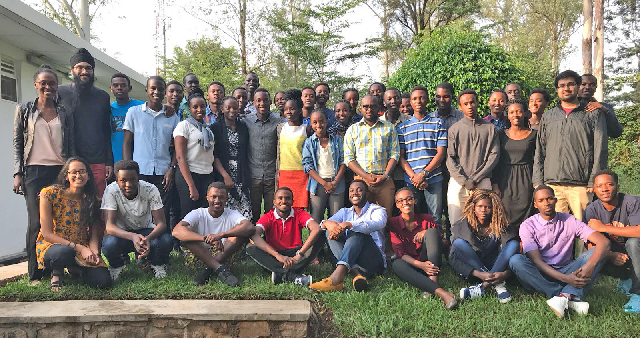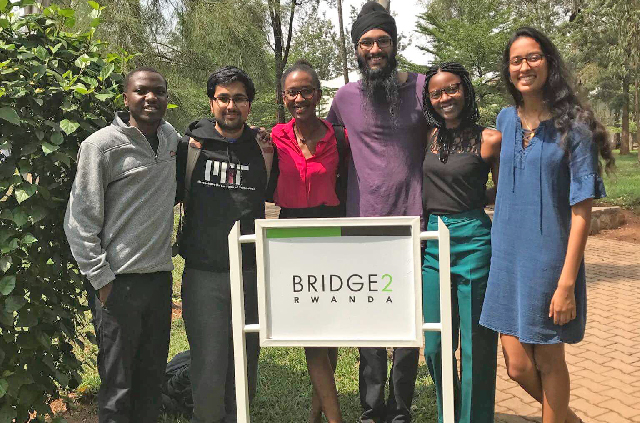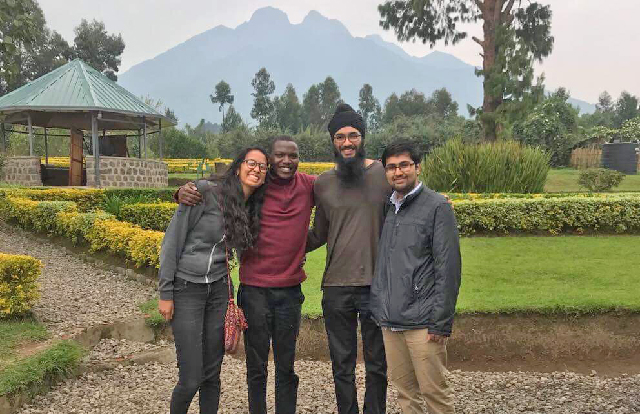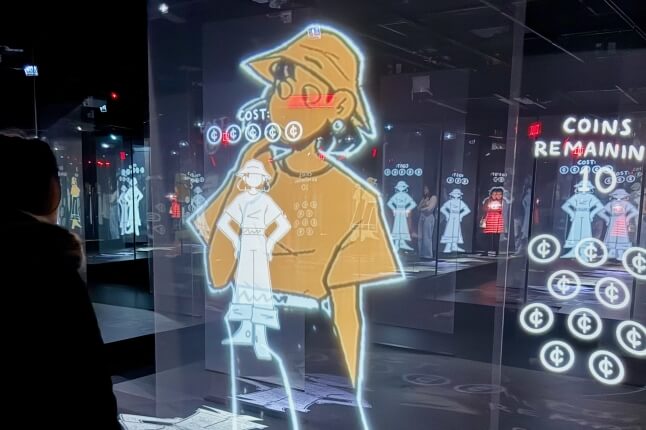News
Students (from left) Suproteem Sarkar, Ivraj Seerha, Bryan Oyaro, and Menaka Narayanan traveled to Kigali, Rwanda to build a web platform for Bridge2Rwanda, a nonprofit that helps African high school students attend college abroad and then find attractive jobs in Africa. (Photo provided by Menaka Narayanan)
One in nine college-educated Africans lives in North America, Europe, or Asia, contributing to a brain drain that hampers economic growth and development in their native countries, according to a United Nations report.
A team of students from the Harvard John A. Paulson School of Engineering and Applied Sciences (SEAS) used their computer science skills to help mitigate this trend.
Four members of the student group Developers for Development (D4D) traveled to Rwanda to build a web platform for Bridge2Rwanda, a nonprofit that helps African high school students attend college abroad and then find attractive jobs in Africa. The project was part of D4D’s Technology in the World initiative, an annual trip that encourages students to learn about and apply their technical knowledge to global development problems.
“In Rwanda, there is a lack of a pipeline towards higher education, especially at elite universities abroad,” said Ivraj Seerha, A.B. ’19, a computer science concentrator. “Bridge2Rwanda trains students to be ready for the challenges of attending college in a different country, but also works to bring that talent back to Rwanda to help rebuild the economy and foster economic growth.”
Working with this nonprofit was especially meaningful because the students met several Bridge2Rwanda scholars at Harvard, who emphasized the impact the organization had on their lives. Since 2012, Bridge2Rwanda has helped 165 students earn more than $40 million in scholarships to 70 universities in eight countries.

The Developers for Development students and the current class of Bridge2Rwanda scholars at the nonprofit's headquarters in Kigali, Rwanda. (Photo provided by Menaka Narayanan)
In Kigali, Rwanda’s capital, the D4D students developed a web platform to help connect Bridge2Rwanda scholars with Rwandan employers. The platform showcases the scholars’ education, achievements, and expertise. The platform’s secure back-end enables companies to post jobs and view scholars’ resumes, and allows students to browse those postings and reach out to company contacts directly.
The new platform provides a more organized and streamlined system than the haphazard Google forms and emails that had served as the primary means of communication, said Menaka Narayanan, A.B. ’19, a computer science concentrator.
“A lot of jobs and internships are originated when a company reaches out. One of the strengths of what we are trying to do is make the scholars’ achievements and interests public, to raise awareness about Bridge2Rwanda for these companies,” said D4D President Suproteem Sarkar, A.B. ’19, a computer science concentrator who is also pursuing a master’s in applied math. “This is not just Bridge2Rwanda reaching out and telling people about their scholars, but also the companies understanding how talented these young people are.”
Creating a platform that was robust enough to enable those different features in only two weeks was one of their biggest challenges, he said.

The Developers for Development students at the Bridge2Rwanda headquarters with Nancy Ndekwe, career development advisor, and Happiness Uwase, lead career development advisor. (Photo provided by Menaka Narayanan)
The team also had to consider different perspectives. For instance, many Rwandan firms don’t regularly post job and internship information online, so employees tend to have less patience for complicated registration processes. The students spent time ensuring that the platform ran quickly and was optimized for small screens, versatility, and use on mobile devices.
“For me, one of the biggest takeaways was the idea that any intervention requires careful thought. It’s not difficult to fall down the rabbit hole of saying, ‘I have this awesome idea. I am going to go somewhere with a magic wand and fix everything without talking to anybody,’” Seerha said. “This experience really taught me that problems are domain-specific. Tech is local, and you really have to think about what you are building and who is going to use it.”
The team also carefully crafted detailed documentation for Bridge2Rwanda employees. They plan to continue working with the nonprofit to ensure the website is fully functional for the next round of applications. D4D may look to help Bridge2Rwanda expand and enhance its online presence in the future, Sarkar said.
Spending time in Rwanda, and meeting some accomplished Bridge2Rwanda scholars, emphasized to Narayanan the significance of their project.
“At Harvard, it is sometimes easy to forget what you are working for. It was nice to get a refreshing reminder that there are a lot of people out there doing really important work, and I felt humbled to work for such a great nonprofit,” said Narayanan, who spent a summer in Rwanda after her freshman year. “It is nice to see that I can use my skills for something I am passionate about.”

Topics: Student Organizations
Cutting-edge science delivered direct to your inbox.
Join the Harvard SEAS mailing list.
Press Contact
Adam Zewe | 617-496-5878 | azewe@seas.harvard.edu



